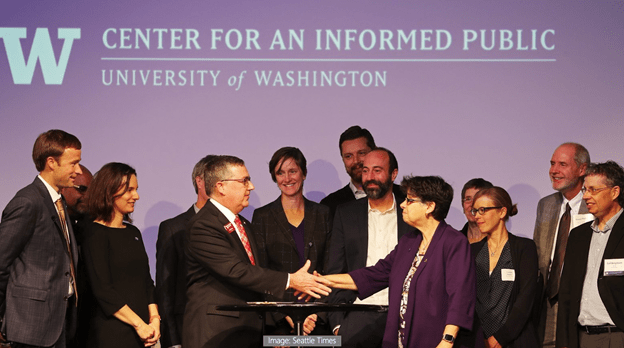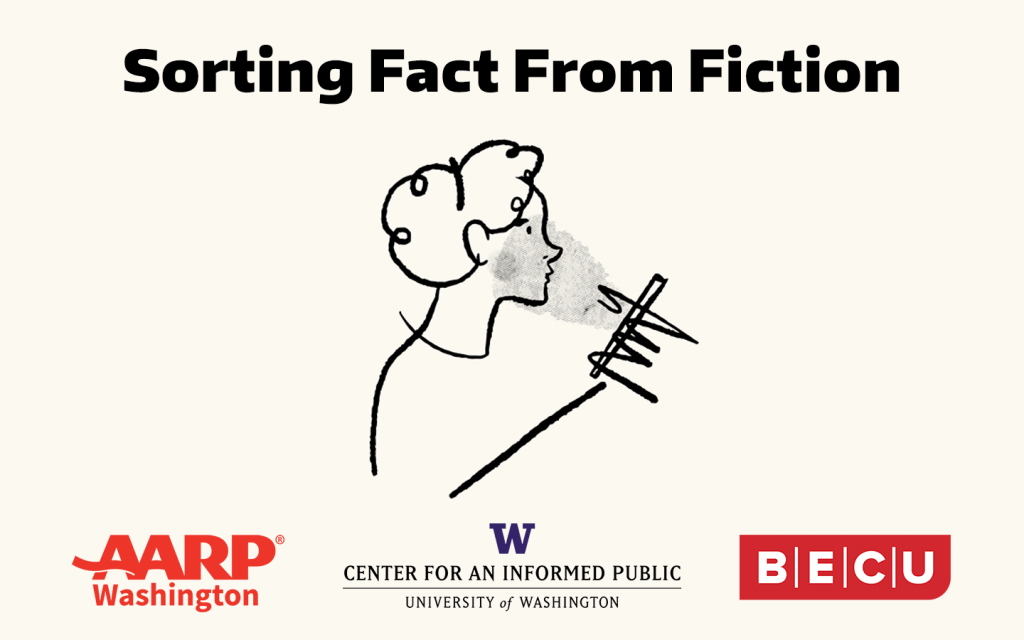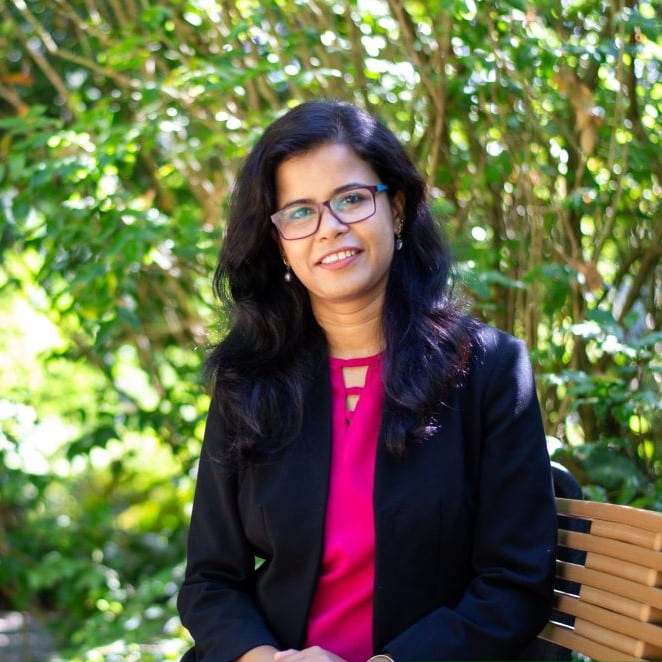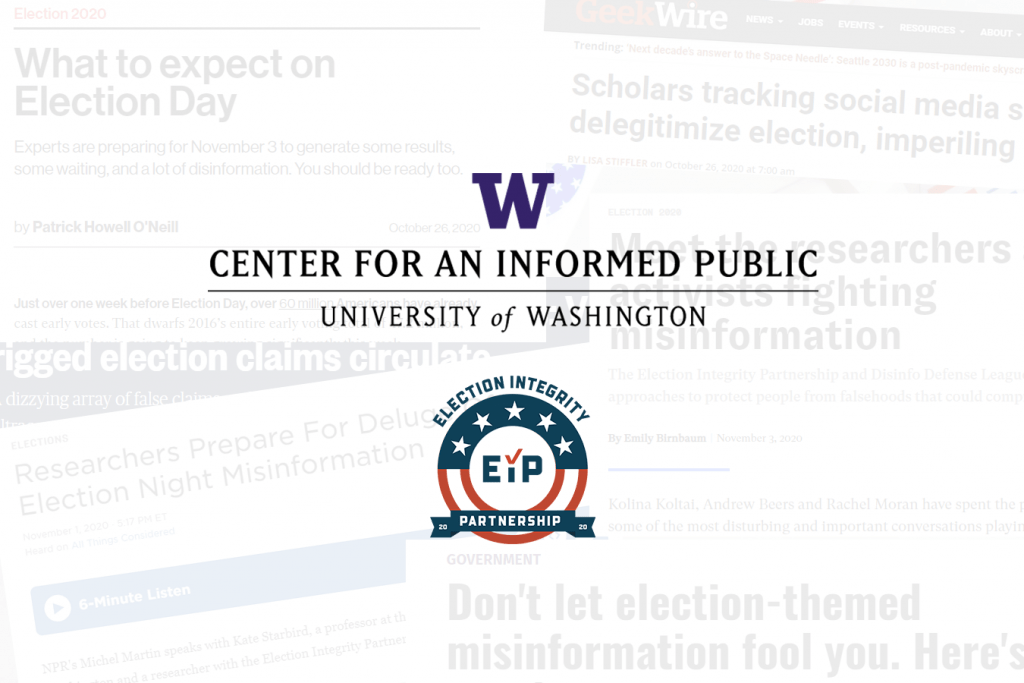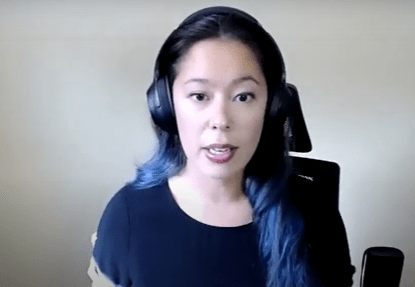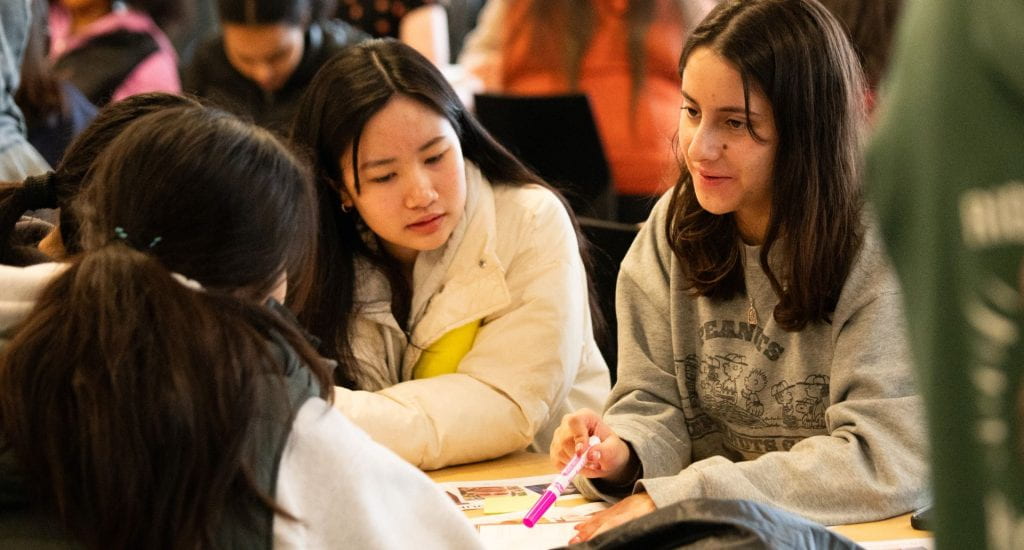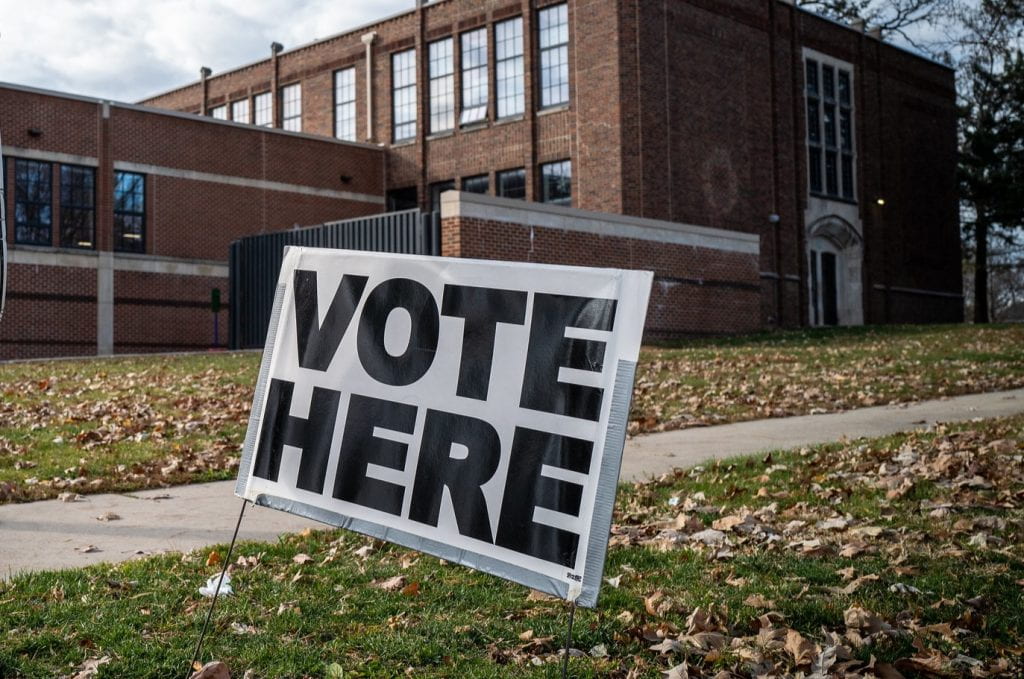This is a web version of the Center for an Informed Public’s News & Insights newsletter for December 2020, which was sent out on Dec. 17. Check out our newsletter archives. Not signed up to received the CIP’s newsletter? Register here.
A year after CIP’s launch, UW-WSU partnership continues to grow
When University of Washington President Ana Mari Cauce and Washington State University President Kirk Schulz shook hands to officially launch the Center for an Informed Public on Dec. 3, 2019 during an event on UW’s Seattle campus, nobody on stage knew just how much the world would change in the weeks and months that would follow and just how well-positioned the new center would be to respond to the uncertainty and challenges everyone would face in 2020.
Many of the CIP’s first-year successes and public engagement wouldn’t have been possible without ongoing collaboration with partners at WSU. But the tumultuous events and disruptions of 2020 prompted the partners to shift gears on how to engage the public on such critically important issues like COVID-19, digital literacy and election integrity.
- ‘2020: THE COURSE’ FEATURING KATE STARBIRD: ‘Mis- and Disinformation During Crisis Events’
// WATCH - DEAN’S FORUM ON RACE AND PUBLIC POLICY: CIP, Evans School partner on ‘2020 Election Retrospective’
// WATCH - JAN. 13 EVENT: CIP’s Chris Coward, Jason Young to discuss ‘Community Approaches to Misinfo’
// REGISTER
CIP, AARP Factcheck Ambassador trainings help retirees sort fact from fiction
Amid a continued onslaught of misinformation online, older adults often face an added challenge of identifying truth and spotting scams in digital spaces, texts and nightly news. To Center for an Informed Public director Jevin West, a partnership with AARP Washington seemed like a perfect opportunity to reach retired adult populations and empower them to contribute directly to research efforts.
New Zealand Institute of Economic Research suggests ‘Calling Bullshit’ for prime minister’s reading list
We may be heading into winter here in Seattle, but summer will soon start in the Southern Hemisphere, where the New Zealand Institute of Economic Research suggested Calling Bullshit: The Art of Skepticism in a Data-Driven World, by the CIP’s Carl Bergstrom and Jevin West, as one of eight books on a summer reading list it recommends to Prime Minister Jacinda Ardern. “Each of these books stimulates critical thinking, not in the sense of finding fault but in inviting reasoned responses to the plausibility of the asserted facts and the coherence of the argument. These processes are essential for drawing on economic theory for policy analysis,” according to NZIER.
Calling Bullshit was also recently included in The Telegraph’s list of 2020 “smart thinking” books, highlighting its “profound implications for science.”
INSIGHTS
How YouTube algorithms push users away from anti-vaccination videos
Markets Insider recently featured research done by Tanu Mitra, a UW Information School assistant professor and CIP faculty member (pictured above), into how YouTube algorithms drive users to or away from conspiracy videos. Mitra’s research was done in collaboration with two PhD students at Virginia Tech, her previous institution, including Prerna Juneja, now at UW. They set out to understand how YouTube recommends videos to its user base by analyzing 56,475 videos on five topics and auditing YouTube’s search and recommendation algorithms.
“No matter how much you search for anti-vaccines, or if a user goes and searches for anti-vaccine videos, the resulting recommendations from the algorithm would still be pointing them to debunking videos, or pro-vaccine videos,” Mitra told Markets Insider. “That’s not the case for other ones, which potentially proves it’ll push you down the rabbit hole if you’re looking for chem trails, but not for vaccines.”
Read more: “Measuring Misinformation in Video Search Platforms: An Audit Study on YouTube”
RESEARCH
Election Integrity Partnership plans to publish final report early next year
A team of researchers from the Center for an Informed Public, which this summer helped stand up the Election Integrity Partnership — a non-partisan consortium of dis- and misinformation researchers and analysts identifying and responding to dis- and misinformation in the 2020 U.S. elections — has been busy in the weeks following Election Day preparing a final report, expected to be released this winter.
The EIP, which also includes Stanford Internet Observatory, Graphika and the Atlantic Council’s DFR Lab, plans to release its final report on the partnership’s efforts to detect and mitigate the impact of attempts to prevent or deter people from voting or to delegitimize election results.
About 20 people from UW are working as part of the Election Integrity Partnership, including CIP principal investigators and postdoctoral scholars; and PhD students, graduate students and undergraduate research assistants from the Information School, Department of Human Centered Design & Engineering, School of Law, Department of Political Science, Department of Sociology and the Allen School of Computer Science & Engineering.
- Read more about the CIP’s contributions to the Election Integrity Partnership in this article by CIP director Jevin West, published as part of the Information Society Project at Yale Law School‘s review of “News and Information Disorder in the 2020 Presidential Election.”
Stay tuned for the EIP’s final report in the new year!
Attention University of Washington faculty and research scientists: Interested in working with the Center for an Informed Public? CIP Faculty and Research Fellow applications are due on Dec. 31. Learn more about how to apply.
This fall, the Journal of Librarianship and Information Science published an article “The role of libraries in misinformation programming: A research agenda,” co-authored by CIP research fellow Jason Young, a senior research scientist at the UW Information School along with Brandyn Boyd, an iSchool Master of Library and Information Science student; Katya Yefimova, a UW iSchool PhD candidate; Stacey Wedlake, UW Technology & Social Change Group research coordinator and analyst; CIP co-founder Chris Coward, an iSchool principal senior research scientist and TASCHA director; and Rolf Hapel, an iSchool affiliate instructor.
A research paper co-authored by Human Centered Design & Engineering PhD candidates Melinda McClure Haughey and Meena Devii Muralikumar, HCDE undergraduate research assistant Cameron Wood, and CIP principal investigator and HCDE associate professor Kate Starbird, “On the Misinformation Beat: Understanding the Work of Investigative Journalists Reporting on Problematic Information Online,” was published in the journal Proceedings of the ACM on Human-Computer Interaction. The paper includes in-depth interviews with twelve journalists and explores how they investigate and report on online misinformation and disinformation.
CIP IN THE NEWS
Since the Center for an Informed Public officially launched late last year, our researchers have been regularly interviewed, quoted or otherwise featured in various local, regional and national news outlets, livestreams and podcasts.
CIP postdoctoral scholar Kolina Koltai (pictured above) has been researching the spread of anti-vaccination misinformation online since 2015. Now as the first COVID-19 vaccine has been approved by the Food and Drug Administration in the United States, Koltai has monitored a swell of vaccine misinformation. Koltai spoke with National Public Radio’s “All Things Considered” about this “perfect storm” of misinformation. Koltai told NBC News that Facebook is a principal culprit in the spread of anti-vaccination misinformation: “Too many people are deeply invested into Facebook, which has the distinct advantage because that is the platform people are on, it is easy to navigate, and it is how users stay connected to friends and families.” Koltai’s interview was republished by Telemundo.
Koltai’s COVID-19 vaccine misinformation research and expertise has been highlighted in many publications this December including: USA Today, Newsy, News 24 France, Raconteur, and the Missouri Independent.
In other recent highlights:
- CIP director Jevin West was quoted in a Nature article after testing an innovative AI tool that summarizes research papers in one sentence: “I predict that this kind of tool will become a standard feature of scholarly search in the near future.” [Nature]
- “1a,” the nationally syndicated news program from Washington, D.C. local NPR affiliate WAMU, hosted West in a discussion about concerns surrounding forthcoming COVID-19 vaccines and declining institutional distrust. [1a / WAMU 88.5 News]
- The UW Daily featured the Dec. 3 Evans School Dean’s Forum on Race & Public Policy “2020 Election Retrospective” virtual event that was hosted in partnership with the CIP and featured West as a co-moderator and CIP co-founder and principal investigator Kate Starbird as a panelist. [The UW Daily]
- Starbird was featured in a Wall Street Journal feature looking back at a year that’s been full of misinformation and disinformation. [The Wall Street Journal]
- Starbird was interviewed by CBS News discussing CIP research into the effects of “participatory disinformation” which are false narratives perpetrated by influential people and their followers. [CBS News]
- Starbird was also interviewed in an Australian Strategic Policy Institute podcast about the actions social media companies are taking to moderate online mis- and disinformation surrounding the U.S. election. [Australian Strategic Policy Institute]
- A tweet from Starbird about “participatory disinformation” was featured in a Vice News article examining baseless conspiracy theories claiming that the U.S. elections were rigged. [Vice News]
- Voice of America News included commentary from Starbird in an article about the changing tactics of Russian influencers. [VOA News]
- The New York Times highlighted work by Ian Kennedy, a UW Department of Sociology graduate student and CIP researcher, and the Election Integrity Partnership in a feature analyzing unfounded post-election fraud narratives on social media. [The New York Times]
- A separate article in The New York Times cited research by Kennedy and Melinda McClure Haughey, a HCDE PhD candidate and CIP researcher, regarding fake Twitter accounts and the spread of conspiracy theories. [The New York Times]
- Ryan Calo, a CIP co-founder, principal investigator and UW School of Law professor, was quoted by KIRO7 News about Washington state’s WA Notify COVID-19 contact-tracing app. [KIRO7]

